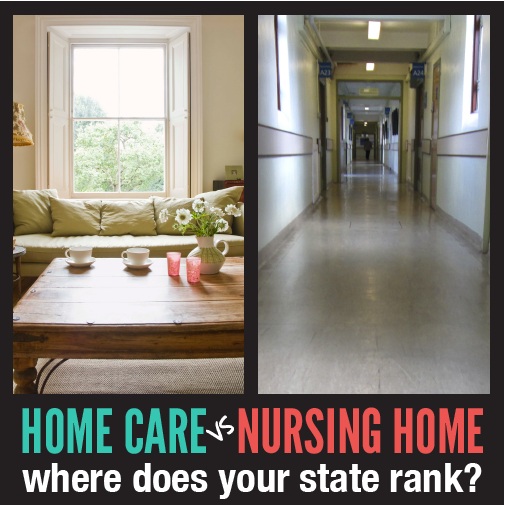AARP Hearing Center

The new state-by-state report measures the effects of state policies and programs on the delivery of long-term care for people who need help to live independently – looking at affordability and access, choice of setting and provider, quality of life and care, support for family caregivers, and how care transitions take place. Prepared by AARP’s Public Policy Institute with support from the SCAN Foundation and the Commonwealth Fund, Raising Expectations 2014: A State Scorecard on Long Term Services and Support for Older Adults, People with Physical Disabilities, and Family Caregivers, ranks each state overall and within 26 performance indicators.
Chad Cheriel, PhD, AARP Oregon volunteer state president, and AARP National Policy Council member, cautions, “although we maintained our #3 national status, Oregon shouldn’t rest on its laurels or be too comfortable with the results of this study. After over a decade of state funding cuts, especially to respite care and caregiver training and supports, Oregon is just beginning to re-invest in caregiver support.”
Oregon rates as a top state when it comes to other attributes of caregiving policies including paid sick leave, nurse delegation of health maintenance tasks, and expending more public safety-net dollars to services that allow one to live independently at home or home-like settings as opposed to just skilled nursing home care. Indeed, Oregon rated as the top state to have lowered extended use of nursing homes to assure transitions back to home or community settings.
The vast majority of older Oregonians want to live independently, at home, as they age – most with the help of unpaid family caregivers. “We have built a system over 35 years which values independence, dignity and choice. It has helped us achieve a high rate of older adults and people with disabilities being cared for at home or in community settings, and the lowest rate of people remaining in skilled nursing facilities beyond a short period of rehabilitation,” said Michael McCormick , Director, Aging & People with Disabilities, Oregon Department of Human Services.
“The Scorecard provides a valuable roadmap for Oregon to focus its improvement efforts,” McCormick continues. “While I am thrilled with Oregon’s #3 ranking, I’m not satisfied. It’s clear there are opportunities to improve supports for family caregivers and maintain quality across the broad spectrum of settings and situations where long term services and supports are provided.”
Today, unpaid family caregivers provide the bulk of care for older Oregonians, in part because the cost of long-term care remains unaffordable for most middle income families. Oregon has an estimated 620,000 family caregivers who provide assistance with bathing and dressing, transportation, finances, complex medical tasks like wound care and injections, and more. The value of this unpaid care totals almost $5 billion. McCormick points out, “Most family caregivers juggle full-time jobs along with caregiving duties…saving the state taxpayer money while honoring their loved ones desires to remain at home. Our policies and practices need to support this invaluable resource.”
Also, as the Scorecard reveals and Cheriel notes, “In just 12 years, the pool of family and friends to care for Baby Boomers as they age into their 80s will be less than half as deep as it is today.” Nationally, the ratio of potential family caregivers to elders needing care will plummet from today’s seven caregivers for each person over age 80 to fewer than three caregivers per elderly person in 2050. In Oregon, the caregiver support ratio in 2010 was 6.9 percent, and by 2050 it is projected to drop to 2.8 percent, placing new demands on a still imperfect long-term care system.
According to the state Scorecard, nearly 60 percent of family caregivers face a degree of stress and worry; placing Oregon at #41 in Support for Family Caregivers. While progress has been made in expanding and improving home care services, there has been a decline in support and training for family caregivers, especially respite care and the transition from hospital to home or community settings. .
McCormick and Cheriel both touted that Oregon pioneered a vision and model for Long-Term Care over 35 years ago with an emphasis on remaining at home and home-like settings. Enacted in 2013 SB 21 established a diverse group of stakeholders who are looking at how Oregon can carry forward this vision throughout the 21 st century. The state has begun to re-invest in caregiver supports and training while restoring some of the funding previously cut over the past decade in both staffing and services. “We are looking at ways to build on the strengths of our system in order to become more efficient in the care of family caregivers and our most vulnerable Oregonians,” concluded McCormick.
The full LTSS State Scorecard, along with an interactive map of state rankings and information is available at www.longtermscorecard.org.
###
About AARP
AARP is a nonprofit, nonpartisan organization, with a membership of nearly 38 million, that helps people turn their goals and dreams into real possibilities, strengthens communities and fights for the issues that matter most to families such as healthcare, employment and income security, retirement planning, affordable utilities and protection from financial abuse. We advocate for individuals in the marketplace by selecting products and services of high quality and value to carry the AARP name as well as help our members obtain discounts on a wide range of products, travel, and services. Learn more at www.aarp.org .
About The Commonwealth Fund
The Commonwealth Fund is a private foundation supporting independent research on health policy reform and a high performance health system.
About The SCAN Foundation
The SCAN Foundation is dedicated to advancing a coordinated and easily navigated system of high-quality services for older adults that preserve dignity and independence.































































